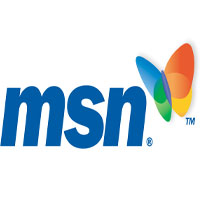- About Us
- Columns
- Letters
- Cartoons
- The Udder Limits
- Archives
- Ezy Reading Archive
- 2024 Cud Archives
- 2023 Cud Archives
- 2022 Cud Archives
- 2021 Cud Archives
- 2020 Cud Archives
- 2015-2019
- 2010-2014
- 2004-2009
 |
Search Wars: Episode IV, Google v Microsoft |

The looming battle over how the world organizes information is about to land squarely upon our desktops, with internet and media commentators unable to pick whose bloody corpse will be left, and who will win the privilege to deliver the search results for “Scarlett Johansson topless” to the most people. While the war cries from both camps scream an imminent explosion of fury, this will be a game of two halves, played out in slow motion. It’s not even safe to assume one will outlast the other, or if there isn’t a new player in town with an idea so sparkling it outshines both.
The efforts so far have been significant, albeit not particularly exciting. Microsoft launching an advertising program, Google placing the highest bid for an Australian-made search algorithm, and this week, releasing new add-ons for Google desktop, alongside a press release confirmation that it’s still in the search business.
Google has been adding to its war chest of online-consumables so slowly from it’s base of operations in Mountain View, California, that it’s hardly been noticeable. It now catalogues at least twenty specialist fields, is expanding into non-text content searching, is currently beta testing an RSS Reader, online maps, search suggest and more. It is an impressive list for any company, but all related to its core business of sorting information for users. What is of real interest is the other areas it’s getting into. It owns the most popular Blogging tool and host in the ‘sphere, and is beta-ing instant messaging, e-mail, web page creator and hosting services, launched a personalized calendar, a file indexing application and has bought an online word processor, Writely.
The company itself is cagey about long-term plans, beyond the stock-answer ‘all in the name of organizing online data’, but there is a purpose to all this activity from Google, but not that they’re telling. They’re becoming very close to having a set of products that comprise a full suite of office applications. All they really need now is simple spreadsheet functionality, and they’ll be making a dent in Works and small-fry Office users.
 The good news for all of us, is that Google has the best pricing policy you’ll ever see – all items free. It’ll work on any platform too. If they pull off a usable and popular suite, it’ll open up the possibility for releasing enterprise-ready software to challenge the real money in office applications. Not much of a leap either for Google’s next step to be creating an understandable and easily used distribution of Linux to further erode Microsoft’s dominance.
The good news for all of us, is that Google has the best pricing policy you’ll ever see – all items free. It’ll work on any platform too. If they pull off a usable and popular suite, it’ll open up the possibility for releasing enterprise-ready software to challenge the real money in office applications. Not much of a leap either for Google’s next step to be creating an understandable and easily used distribution of Linux to further erode Microsoft’s dominance.
And what does Microsoft have to add under the kilt? A revamped MSN search, Internet Explorer 7 and maybe next year, maybe the year after, a fresh operating system, Vista. Oh, and more anti-piracy nagging from its applications. It’s not really breaking new ground for the company, or for the consumers.
Microsoft’s re-attempt at search engines can only work if a significant number of people decide to switch. Bill Gates, clearly back commanding his legions, is pushing hard in the media about the fight with Google. This posturing has more about getting users to pay attention to searching with Microsoft than anything else. Gates knows that it doesn’t matter how good the search is, but rather that people hear that it is better. He also knows that it doesn’t matter what you say about the competition, so long as it hurts them. He’s not holding back, proclaiming he’ll “keep Google honest”. Him? Really?
Battles tend to have collateral damage, and in the Google v Microsoft war, it’ll come in the form of PR. Microsoft is well regarded as the leader of the monopolist pack, decried as an evil empire by users and detractors alike. Microsoft would do well to remember that, while they might do better, there’s always more that can be lost. Gates isn’t exactly charisma central. In comparison, Google is seen as a rather benevolent force by the public at large, and has only attracted a few genuine detractors. Websites such as Google-watch and Scroogle have been running their privacy insurgency for a while now – but it won’t take long before the war shapes up with unwanted attention at how Google has snuck into our lives.
 “Googlesteppers”, web users that avoid Google’s personal data mining, claim that Google shouldn’t be collecting so much specific information from users.
“Googlesteppers”, web users that avoid Google’s personal data mining, claim that Google shouldn’t be collecting so much specific information from users.
Google’s cookie tracks everything about what we’re interested in and how we interact with other internet users, along with information that can identify individual users. How they manage the insane amount of consumer information this brings is mind-boggling to say the least. Microsoft, Yahoo and the rest all do it, but since Google has been hogging all the PR gold stars, they have the most to lose from too-public questioning over the matter. They can chant their ‘do no evil’ mantra all they want, but Google’s all grown up now and it has to play like an evil corporate to defeat one.
Microsoft v Google will be one to watch, at a distance. So sit back, relax, as both camps bulldoze American farmland to house vast data banks and prepare to battle for the privilege of delivering results for every mind-numbing request we have. Let’s just hope, at the very least, searching the web will become easier as a result.
James Cleave is a freelance writer. He can be reached via his blog at http://urbancast.blogspot.com
